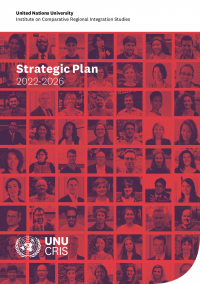UNU-CRIS Strategic Plan 2022-2026

Never have we been so connected, no longer bound by geography to our specks on the world map. In our truly global age, underpinned by the movement of people, data, capital and ideas across hemispheres, land and sea, the challenges we face have followed suit, no longer respecting natural and national borders.
Yet, instead of coming together to fight these challenges, we find ourselves in a period of fracture and facing the return of geopolitics. Faith has been lost in decision-making bodies, at a crucial moment in history when collective action is needed most. Good governance driven by effective policy is needed to restore confidence, reverse the trend and address the many challenges we collectively face. Targeted, rigorous research to inform these policies is the first step. This is why we, with our global network and mandate as the UN’s think tank on cooperation and governance across different policy areas and levels, can play a vital role in the coming years.
This strategic plan for the coming five-year period builds upon the foundation laid during the previous strategic programming period of 2017-2021 and the evolution of the world throughout this period, which brought new problems to the fore and illuminated the need for engagement and interaction across the multiple levels of governance to address them.
Our experience during this period allowed us to mould ourselves and our research to what is needed by the world around us and forms the pillars of the new strategic plan – clear, in-demand, policy-relevant research programmes and clusters that utilise our expertise and its network to address current and emerging challenges of governance and cooperation. This is underpinned by the understanding that these are often cross-border and/or multi-level, ranging from the supranational (multilateral and regional) to the nation-state, and subnational entities such as regions and cities. The interaction between these levels of governance, in terms of their coordination, their congruence and their conflicts, is often a key factor in the success of their policies.
The interplay between these challenges – climate-induced migration, pandemic-induced recessions, cybersecurity, cities and regions operating in the international sphere, to name just a few – demonstrate the need for an interdisciplinary approach, working across themes and forming a community of expertise and backgrounds.
UNU-CRIS has the expertise, scope, and network to be a key knowledge producer as we navigate this challenging moment in history.
